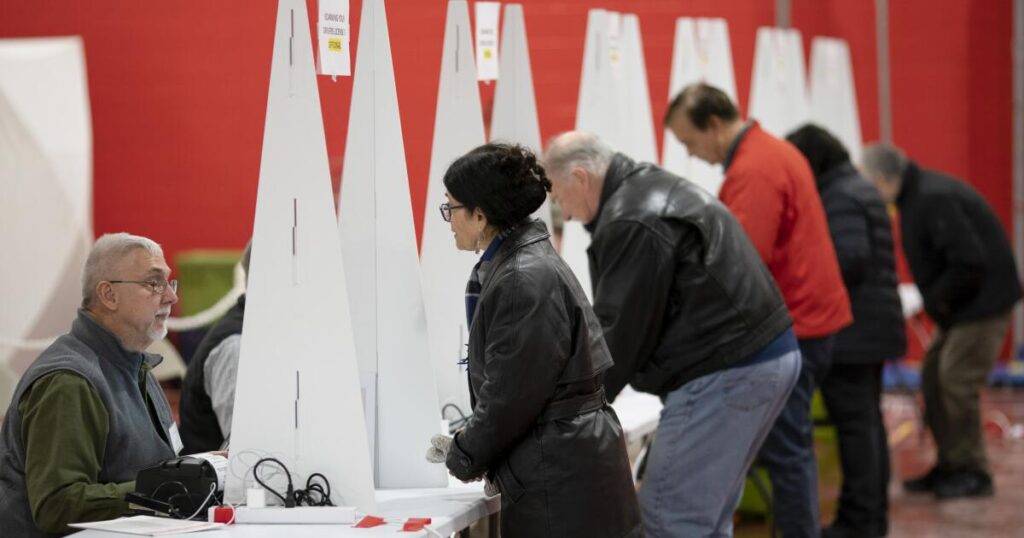WASHINGTON — Many Democrats see their political party as “weak” or “ineffective,” while Republicans are more complimentary of their party, although a small but significant share describe the GOP as “greedy” or say it is generally “bad,” according to a new poll.
The poll conducted by the Associated Press-NORC Center for Public Affairs Research in July reveals warning signs for both major U.S. parties as the political focus shifts to elections in New Jersey and Virginia this fall and the midterm contests next year.
Respondents were asked to share the first word or phrase that came to mind when they thought of the Republican and Democratic parties. Answers were then sorted into broad categories, including negative and positive attributes. Overall, U.S. adults held a dim view of both parties, with about 4 in 10 using negative attributes, including words such as “dishonest” or “stupid.”
But nearly nine months after Republican Donald Trump won a second presidential term, Democrats appear to be harboring more resentment about the state of their party than do Republicans. Democrats were likelier to describe their own party negatively than Republicans. Republicans were about twice as likely to describe their own party positively.
“They’re spineless,” Cathia Krehbiel, a 48-year-old Democrat from Indianola, Iowa, said of her party.
She believes the party’s response to the Trump administration has been “scattershot.”
“I just feel like there’s so much recently that’s just going abhorrently wrong,” Krehbiel said. “And they speak up a little bit and they roll right over.”
Democrats’ views
Overall, roughly one-third of Democrats described their party negatively in the open-ended question.
About 15% described the Democratic Party using such words as “weak” or “apathetic,” while an additional 10% believe it is broadly “ineffective” or “disorganized.”
Only about 2 in 10 Democrats described their party positively, with roughly 1 in 10 saying it is “empathetic” or “inclusive.” An additional 1 in 10 used more general positive descriptors.
It is unclear what effect the Democrats’ unease may have on upcoming elections or the political debate in Washington, but no political organization wants to be plagued by internal divisions.
Still, the Democrats’ frustration appears to reflect their concern that party leaders are not doing enough to stop Trump’s GOP, which controls Washington.
There is little sign that such voters would abandon their party in favor of Trump’s allies in upcoming elections, and the vast majority of Democrats described the GOP negatively. But disaffected Democrats might decide not to vote at all. That could undermine their party’s push to reclaim at least one chamber of Congress in 2026.
Jim Williams, a 78-year-old retiree from Harper Woods, Mich., is a self-described political independent who said he typically supports Democrats, but he is “disappointed” with the party and its murky message. He views the Republican Party as much worse, saying it “has lost it” under Trump’s leadership.
“All he does is bully and call names. They’ve got no morals, no ethics. And the more they back him, the less I like them,” he said of Trump.
Republicans’ views
Republicans are about twice as likely as Democrats to describe their party positively, with many also using straightforward ideological descriptors like “conservative.”
About 4 in 10 Republicans used positive attributes to characterize the GOP, making general mentions of words such as “patriotic” or “hardworking,” or offering associations with the word “freedom.”
Samuel Washington, 65, of Chicago, said he typically votes Republican. He praised Trump’s leadership, even while acknowledging that the president’s policies on trade and spending might be creating short-term economic hardship.
“There’s a lot of pain, but the pain is the result of 12 years of misuse and misguided leadership from the Democratic Party,” he said. “I’m feeling really good about Republicans and the direction that they’re going.”
But views were not uniformly good. About 2 in 10 Republicans said something negative about the party, including phrases such as “greedy,” “for the rich” or “corrupt.”
Republican Dick Grayson, an 83-year-old veteran from Trade, Tenn., said he is “disappointed” by his party’s fealty to Trump.
Among other things, he pointed to the price tag of Trump’s tax-and-spend package, which will add nearly $3.3 trillion to the nation’s debt over the next decade, according to the nonpartisan Congressional Budget Office.
“I’ve always been a Republican, but I’m disillusioned about both parties,” Grayson said.
Americans’ views overall
Among all Americans, the poll finds that the Republican Party is viewed slightly more negatively than the Democratic Party. The different is not large: 43% used negative words to describe the Republicans, compared with 39% for the Democrats.
Much of the negativity is driven by the opposing party — and nonaligned voters’ distaste for both. So-called political independents are much likelier to describe both parties with negative attributes rather than positive descriptors, though a significant share did not offer an opinion.
Curtis Musser, a 60-year-old unaffiliated voter from Beverly Hills, Fla., said both parties have shifted too far toward the extreme for his liking.
He said he is ready for a serious third party to emerge before the next presidential election, pointing to Elon Musk’s new America Party, which has been slow to launch.
“Maybe he would get us headed in the right direction,” the retired schoolteacher said.
The AP-NORC poll of 1,437 adults was conducted July 10-14, using a sample drawn from NORC’s probability-based AmeriSpeak panel, which is designed to be representative of the U.S. population. The margin of sampling error for adults overall is plus or minus 3.6 percentage points.
Peoples, Sanders and Yoo write for the Associated Press. Peoples reported from New York, Sanders and Yoo from Washington.
